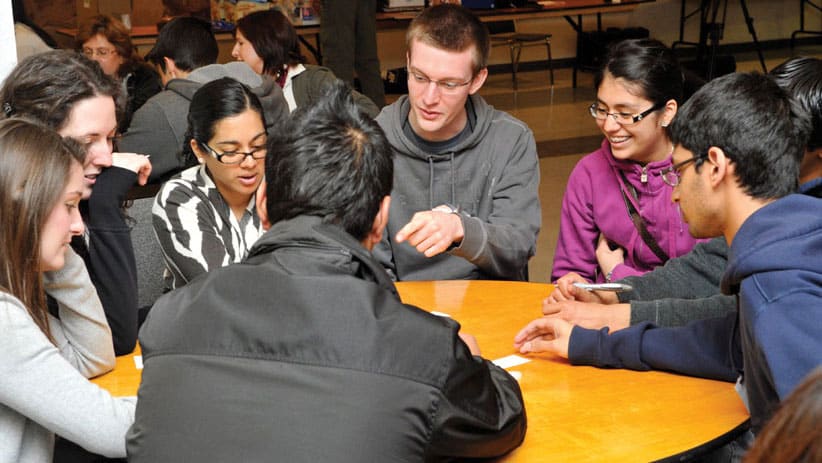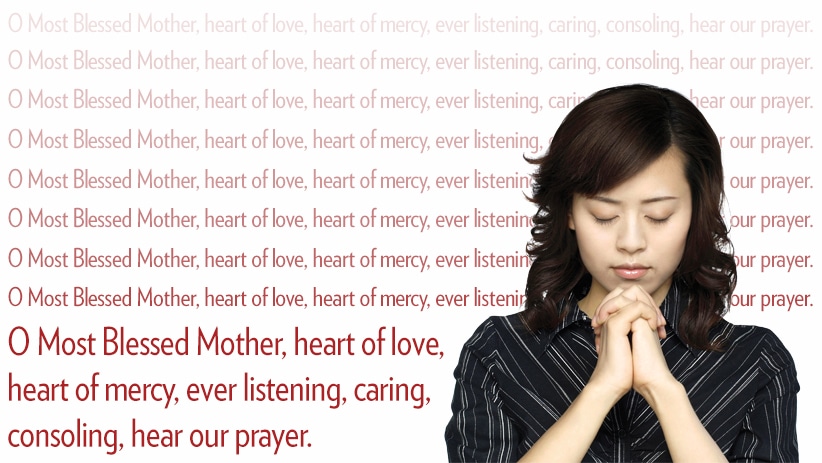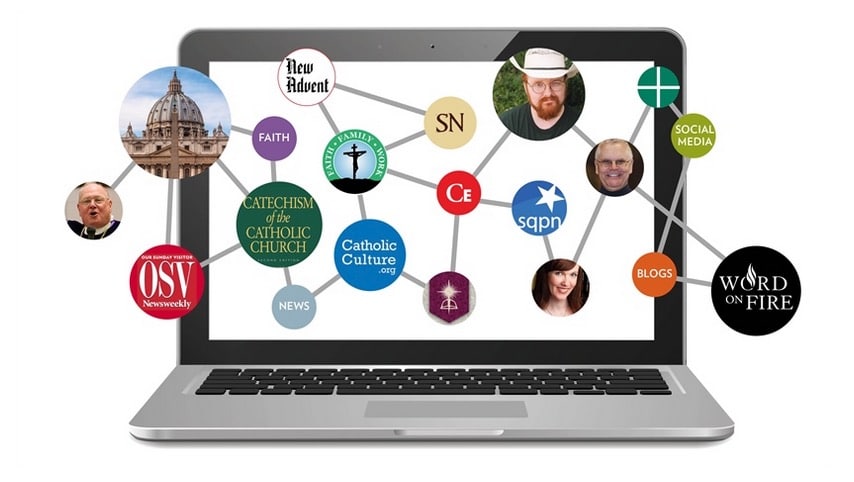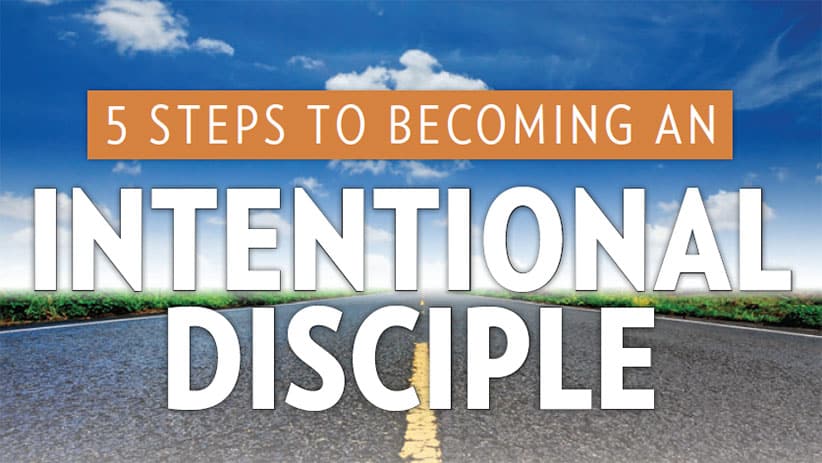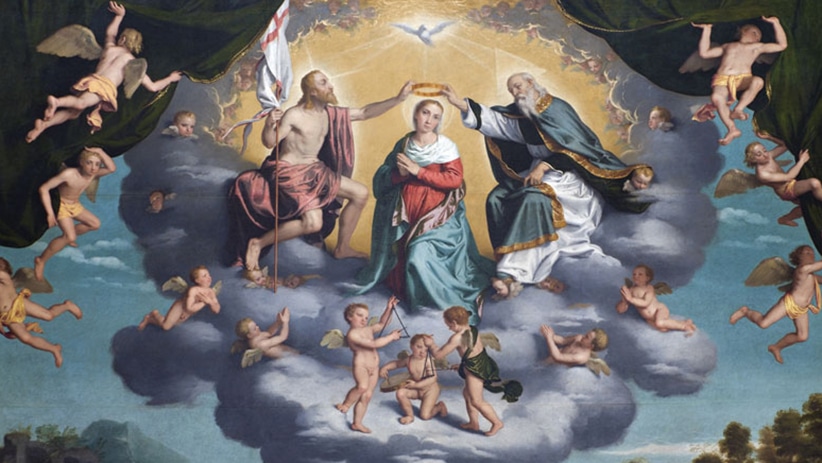To the American media, Pope Francis is an enigma wrapped inside a conundrum.
When the present Holy Father condemns unfettered capitalism, the political left cheers, while the political right looks on askance.
But when Francis condemns abortion, the left falls silent and the right applauds.
Both sides, alternatingly, attempt to claim the pope as their own, but neither can hold onto him for long. He’s always just one Wednesday audience away from saying something that prevents him from fitting neatly in anyone’s political box.
In the meantime, many Catholics seem as confounded as the press. The pope’s every statement is hotly debated on blogs and Facebook, while Twitter lights up whenever one of those box-defying statements appears.
Why all the confusion? Why, both inside and outside the Church, are so many people scratching their heads at Pope Francis? And why would so many more be scratching their heads if they carefully worked through his predecessors’ writings as well?
According to Dr. Michel Therrien, professor of moral theology at the Augustine Institute, the head-scratching stems from far too many Catholics (and far more non-Catholics) not knowing or understanding Catholic social teaching.
“Most people lack a comprehensive and integrated view of Catholic social teaching,” he said. “People on both the left and right tend to interpret it through the lens of their political party’s platform. They’re not looking at the whole teaching. They read it selectively.”
Acquiring that comprehensive view requires reading and reflection. Even more importantly, however, it requires knowing how the Church understands her social doctrines and calls her children to approach them.
In essence, it requires knowing the “what,” “why,” “how,” “where,” “who” and “to what end” of Catholic social teaching.
What?
First things first: When the Church talks about Catholic social teaching, what does it mean? Is it a list of policy positions to which Catholics must assent? Is it akin to the Catholic voter guides distributed in election years, with checkboxes telling Catholics they must oppose abortion or support universal healthcare?
Not quite.
Rather, explained Dr. Steven Brust, who teaches political science at Lock Haven University, “Catholic social teaching is a full view of the human person and all his social relations.”
Or, in one word, it’s an anthropology — a moral theology that addresses the origin, nature and destiny of human beings. In that, it helps us understand who we are. It also helps us understand how we’re called to live in community with one another.
When we approach Catholic social teaching like that, said Dr. Jonathan Reyes, executive director of the Department of Justice, Peace and Human Development at the U. S. Conference of Catholic Bishops, it helps us make sense of the complex problems in the world today, as well as how to apply the Church’s moral vision to those problems.
“The right anthropology will sort out how the various principles apply at any given moment,” he explained. “Only if you have the right understanding of the human person as created by God in community, only if you understand the fullness of that vision, can you start building a just society.”
The vision itself — as revealed in Scripture, explained by the magisterium and synthesized in the Compendium of the Social Doctrine of the Church — is threefold. First, whatever Catholics do in the social order (economic, political and community life) has to serve the good of the human person, who is made in the image and likeness of God. Second, charity and justice oblige all men and women to serve the common good. Third, that service is a way of proclaiming the Gospel.
| Key Themes of Catholic Social Teaching |
|---|
|
Although the Church’s social doctrines touch upon almost every area of political, economic and family life, seven key themes are at the core of all its social teachings. As outlined by the U.S. Conference of Catholic Bishops, those themes are: Life and Dignity of the Human Person: Every human life is sacred and should be treated with great dignity.
Rights and Responsibilities: Every person has a right to live, as well as the responsibility to fulfill our duties to our family, neighbors and society. Option for the Poor and Vulnerable: Both individuals and society are called to treat the poorest and the most vulnerable with special attention and compassion.  The Dignity of Work and the Rights of Workers: Work is one of the ways in which men image God, the Creator, and is meant for the good of men; men are not for the good of work. Solidarity: As one human family, we are obliged to pursue peace and justice for all. Care for God’s Creation: We show our respect for God’s creation by exercising good stewardship. |
Why?
That’s “the what” of Catholic social teaching. But “the what” can only be understood when paired with “the why” — why that moral vision matters and why people across the centuries have worked to incarnate that vision in action.
“The why” is Jesus.
“Pope Francis, very much in line with John Paul II and Benedict XVI, is calling Catholics to root their reflection about the social order where it should be: the love of Christ,” said Reyes. “He wants every Catholic to reflect on the extent of their conversion to Love Incarnate.”
As the Church sees it, the motivation for living out her social teachings doesn’t come from a desire to further a political agenda. It flows from a desire to show others the love Christ has shown us. It’s a fruit of authentic conversion, the natural response of a creature transformed by God’s gratuitous love.
Even more fundamentally, putting the Church’s social doctrine into practice is rooted in a desire to love Christ himself.
Jesus told his disciples in Matthew 25:40, “Amen, I say to you, whatever you did for one of these least brothers of mine, you did for me.” Accordingly, to feed the hungry, care for the orphaned, defend the unborn and treat workers justly, is to feed Christ, care for Christ, defend Christ and treat Christ justly.
For that reason, when it comes to improving the social order, the Church believes a right relationship with Christ matters most.
Explained Reyes, “The modern temptation is to find a technological or institutional solution to a problem. But the fundamental fix necessary is the relationship. Get the relationship right and the rest will follow.”
How?
That brings us to “the how.” How do we live lives in accord with the Church’s social doctrine?
According to Brust, we start by pursuing holiness.
He explained, “People think of Catholic social teaching as something that primarily happens ‘out there’ — in the community, in the government, in the structures of the economy. That’s true. It should be lived there. But it starts inside each one of us. First and foremost, it requires a growth in holiness.
“We can be holy even if all the institutions are corrupt,” he continued. “It makes it much more difficult (especially with structures of sin), but not impossible. If, however, all the people are corrupt, the institutions will be as well. If there’s personal holiness, it’s easier to change the institutions.”
Likewise, the more people focus on how they can best serve Christ, the less likely they’ll find their thinking held hostage by one party’s political agenda.
“If we don’t approach these problems with a fundamentally spiritual disposition, we’ll just pile up arguments,” said Reyes. “An encounter with Christ in prayer, the sacraments and Scripture, as well as in the poor and marginalized, opens up the heart to seeing with Christ’s own eyes. Peace and justice are rooted in this fundamental encounter and built upon it.”
Where?
For the Church, the family is the primary “where” of Catholic social teaching. In a sense, it’s both origin and destination.
The family is where Catholic social teaching originates, explained Brust, in that, “It’s where human beings learn how to be human. It’s where you recognize your dignity and the dignity of others. It’s where you grow in temperance, prudence, fortitude, generosity, faithfulness, sacrifice and kindness. It’s where you learn to live in communion with others.”
“The family makes good Catholic citizens,” summed up Reyes. “It’s a training ground for the virtues.”
That, in turn, is why strengthening the family is a destination or aim of Catholic social teaching. The family is the first and most natural human society. On its health and strength, a society’s health and strength depends. Accordingly, the family is what the Church’s social doctrines advocate advancing and protecting.
In “Seven Themes of Catholic Social Teaching,” the USCCB put it this way, writing that, in a just state, “marriage and family are the central social institutions that must be supported and strengthened, not undermined.”
“When the family breaks down, that leads to a deformation of the human person,” said Therrien. “That has huge consequences for the commonwealth. People can’t contribute because they’re not well formed individuals. The society is left trying to clean up the mess, but it can’t. The state can’t do what the family does. That’s why society has to promote, protect and serve the family. In serving the family, it strengthens the social order.”
Who?
It’s not, however, only a nameless state that’s supposed to do all the promoting, protecting and serving. Nor is it primarily the clergy and Church hierarchy.
Rather, the task of building a culture infused with the Gospel falls, in the main, to the Catholic laity.
“As adults, living in the world, we bear the brunt of the responsibility for the social order,” said Therrien. “It’s the distinctive call of the laity and one concrete way in which we can fulfill our vocation to be witnesses in the public square.”
Unfortunately, thanks to a combination of inadequate catechesis and formation, many Catholics don’t know that, and many more don’t know how to do that — how to integrate their faith into their work or social life or how to practice faithful citizenship.
Correcting that problem, Therrien said, starts with education — Catholics making an effort to familiarize themselves with the Church’s social doctrines.
Then, it requires putting faith into action.
“Each of us has to live out our commitment to love our neighbor as ourselves,” he said. “Families need to be the first responders to any crisis within their sphere of influence. When a neighbor falls on hard times, it’s our responsibility to help them. We can’t have a social welfare mentality, assuming we don’t have to do something because the state will take care of it. That’s a very un-Christian response.”
Lastly, Therrien added, we’re called to be responsible citizens — exercising prudence in how we vote and making positive contributions to the social and economic order, all while taking the Church’s vision of man and the common good into account.
To What End?
But what if we don’t? What’s at stake in the call to live out Catholic social teaching? Will some socialist utopia or capitalist paradise not come to pass?
Unfortunately, the consequences are worse than that.
“Catholic social teaching is geared toward our salvation,” explained Brust. “That’s what it’s for. The more specific teachings and principles exist to promote and achieve that. Certain behaviors separate us from God. Others draw us closer to him. Catholic social teaching helps us choose the good and avoid the bad, even in difficult situations.”
What the Church’s social doctrines do for individuals trying to live in accord with them, they also do for those living in cultures shaped by them.
They give rise to a society that helps, rather than hinders, the pursuit of holiness — a society where virtue can more easily flourish and where vice can more easily be avoided.
“In Matthew 28, Jesus tells the apostles to go and proclaim the Gospel to the nations,” said Therrien. “We get stuck in this worldview where we think about evangelization only in terms of individuals, but that’s not what Jesus said. The new law of the Gospel is a law given to the nations. And our call is to transform the nations according to the principles of the Gospel.”
| The Catholic Social Teaching Glossary |
|---|
|
Charity: “The theological virtue by which we love God above all things for his own sake, and our neighbor as ourselves for the love of God” (Catechism of the Catholic Church (CCC), No. 1822) Common Good: “The sum of those conditions of social life which allow social groups and their individual members relatively thorough and ready access to their own fulfillment” (Gaudium et Spes, No. 26). Family wage: “A wage sufficient to maintain a family and allow it to live decently. Such a wage must also allow for savings that will permit the acquisition of property as a guarantee of freedom” (Compendium of the Social Doctrine of the Church (CSD), No. 250) Justice: “The moral virtue that consists in the constant and firm will to give their due to God and neighbor” (CCC, No. 1807). Just War: “The strict conditions for legitimate defense by military force … the damage inflicted by the aggressor on the nation or community of nations must be lasting, grave, and certain; all other means of putting an end to it must have been shown to be impractical or ineffective; there must be serious prospects of success; the use of arms must not produce evils and disorders graver than the evil to be eliminated” (CCC, No. 2309). Preferential Option for the Poor: “The principle of the universal destination of goods requires that the poor, the marginalized and in all cases those whose living conditions interfere with their proper growth should be the focus of particular concern” (CSD, No. 182). Subsidiarity: “A community of a higher order should not interfere in the internal life of a community of a lower order, depriving the latter of its functions, but rather should support it in case of need and help to coordinate its activity with the activities of the rest of society, always with a view to the common good” (Centesimus Annus, No. 48). Solidarity: “‘Friendship’ or ‘social charity’ … manifested in the first place by the distribution of goods and remuneration for work. It also presupposes the effort for a more just social order … [and] goes beyond material goods” (CCC, Nos. 1939-1942). |

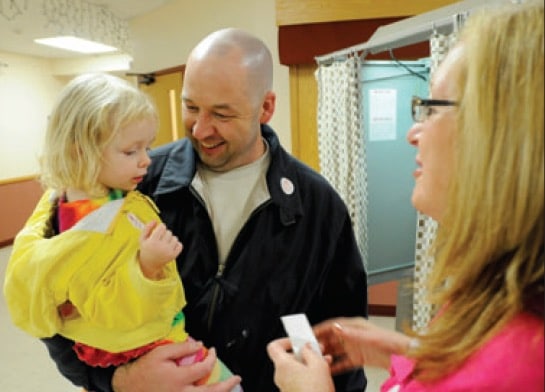
 Call to Family, Communion and Participation: We are called to communion with one another in the family and in society. The family in particular, as the first human community, must be supported and strengthened.
Call to Family, Communion and Participation: We are called to communion with one another in the family and in society. The family in particular, as the first human community, must be supported and strengthened.